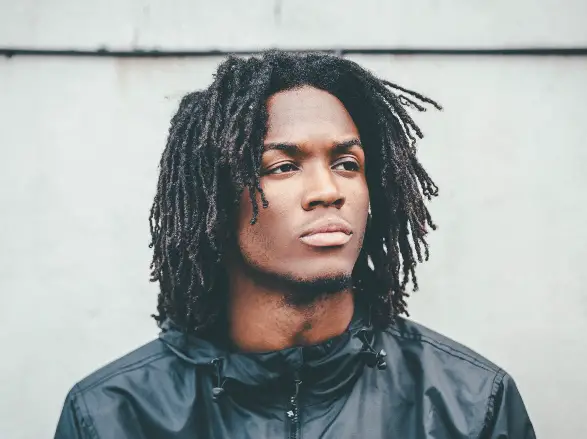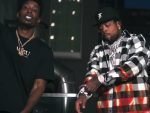Many of the critiques levied at modern hip hop focus on the genre’s coarse language, disrespect for women, glorification of substance abuse, violence and lack of substance. The genre has gotten so muddled, in fact, that many of rap’s forefathers have voiced their disapproval of where the sound appears to be heading. Jay Z, for instance, mocked the style, swag and overall demeanor of modern rappers a number of times on his 13th platinum-selling LP, “4:44.”
Many hip-hop fans, too, seem to be embracing this negative outlook on the game. To those fans, I scream from the rooftops, “THERE IS HOPE!” For those of you who expect a higher quality from hip hop, meet Saba.
The 24-year-old rapper and producer from Chicago is the epitome of hip-hop pioneering. Saba grew up in a music-oriented family and drew a great deal of inspiration from his father on his journey to becoming an MC. He enrolled at Chicago’s Columbia College at the age of 17, after graduating high school at 16 with a 3.5 GPA. Born Thaj Malik Chandler, Saba is a highly intelligent individual with an amazing life story that bleeds through his music.
Saba popped up on the rap radar in 2013 when he appeared on Chance the Rapper’s mixtape, “Acid Rap” in the song “Everybody’s Something.” Although the song may pale in comparison to other favorites on “Acid Rap,” such as “Pusha Man/Paranoid,” “Lost” and “Smoke Again,” Saba’s brief verse on the tape led to a feature on Chance’s “Angels.” The track was a promotional single for Chance’s third mixtape, “Coloring Book,” which earned Chance three Grammys and two additional nominations.
Despite his high-profile appearances, Saba’s Instagram account, has yet to break 100,000 followers. Saba’s brief yet dense discography is even more reason why I’m baffled at the lack of recognition for such a talent.
A couple of Saba’s early mixtapes are “GETCOMFORTable” and “COMFORTZone.” “GETCOMFORTable” acts as more of an artistic outlet for Saba to hone his craft and create his own unique sound rather than exist as a cohesive project. However, the mixtape contains several glimpses of the lyrical genius Saba is on his way to becoming. The combination of his wordplay, use of details and imagery and his diversity of sound make it very apparent to a listener that something special is brewing in this rap artist.
From both a production and lyrical perspective, Saba’s performance on “COMFORTZone” exhibits the maturity and smoothed edges that were absent from his previous output. His beat-making skills glisten on the track “Butter (Ft. Jamila Woods),” with the gentle twinkles and synths that cover the foreground of the beat, while a kicking bass supports the background. Saba’s instrumental is layered and mixed beautifully with the tempo changes that appear throughout the track. He creates a euphoric atmosphere for the listener and raps in a cartoon-like voice with a rhythm so hypnotizing it’s impossible to refrain from bopping your shoulders. Saba creates several other wavy (and at times thunderous) psychedelia-inspired environments for the audience to explore on songs such as “Welcome Home,” “Westside Bound” and “TimeZone.”
Saba also received a greater level of assistance on this tape from outside producers like Ken Ross and Cam O’bi. He collaborated with Born Ready Productions on the track titled “401K,” which will roar through your speakers. “COMFORTZone” is the first glimpse of the versatility Saba flexes in not only his choruses, verses and beat production, but in the range of emotions he can express on one project.
Saba’s debut album, “Bucket List Project,” only reinforces his triple-threat reputation. The proof is immediately apparent in the two-track “Stoney (Ft. Phoelix & BJRKNC),” where Saba executes a mind-warping instrumental sprinkled with sounds reminiscent of wind chimes. He raps every verse on “Stoney” with a playful, innovative flow. In between the terrific verses he chants a catchy hook that perfectly accents the song.
Saba continues to challenge himself as the 13-song track list plays on. In “Church / Liquor Store (Ft. Noname Gypsy),” he tackles several societal issues, including economically disadvantaged communities that are predominately African American. In my opinion, his two verses in this song contain some of the most innovative wordplay and rhymes in modern rap. Noname also contributes a poetic verse that is clever and smooth as hell. Saba’s lines build off of each other rhythmically — he is a true machine gun-spitter that can utilize both deep and high tones, and is able to switch speed at a moment’s notice.
“Bucket List Project” contains a great deal of storytelling by Saba about his experiences trying to complete his “Bucket List.” In the song “American Hypnosis,” Saba confesses brutally honest parts of his life, including violence toward his mother, the lack of opportunities for black children and his anxiety. He touches on these difficult subjects while crafting a beautiful sound, contributing to the “hypnotic” environment of the song. He isn’t complacent; Saba doesn’t give his listeners surface level content. Instead, he gets very personal with his music, almost as if he is speaking to you directly.
It’s not all deep feelings though. Saba also includes some bangers on “Bucket List Project,” with tracks like “Westside Bound 3 (Ft. Joseph Chilliams)” and “Bucket List (Ft. Matthew Santos).” He brings a high level of energy into both of these bops, and his lightning-speed flows thrive in their uplifting sound.
The main takeaway from “Bucket List Project” is that each song sounds entirely different. It is difficult to get bored in a full play-through of the album because there are so many admirable aspects that contribute to the overall “celebratory aesthetic.” Saba’s debut album is special and deserves far more recognition than it has received. Its lack of popular features and “club noise” have likely contributed to its limited amount of attention.
“Care for Me” (2018) is Saba’s second studio album. If “The Bucket List Project” is a vibrant, colorful, uplifting celebration of life, then “Care for Me” is its polar opposite, embracing the struggles of depression and dissatisfaction, with an overlay of somber jazz beats.
His sophomore album opens with “BUSY / SIRENS (Ft. theMIND).” The two-part song is a soothing confession of Saba’s inner loneliness and his inability to connect with others. The vocal effects in the song’s chorus and theMIND’s background vocals throughout the “BUSY” half of the track wonderfully complement Saba’s rhyming. When theMIND takes the stage, his soulful voice soars over echoed vocal samples. It gave me goosebumps on my first listen.
The instrumental in the first half transitions seamlessly into an upbeat, wavy kick, and Saba continues to use auto tone in “SIRENS” as he sings an alluring hook that leads to a bouncy flow. The lines in this verse are impeccable and conclude with: “Clutch that purse ‘cause of my dreadlocks / Cross that street ‘cause I’m with my friends / Curse every song in hip hop / Keep telling yourself it’s a fad.” This line caught my attention when I first heard it because of its undeniable truth. We convince ourselves the genre will change and take a more positive route, but with the way things have played out, it becomes less clear that hip hop will change for the better.
The greatest characteristic of Saba’s music is that it is very meaningful, especially in contrast to most of the popular rap songs out there. There are messages in all of his songs, and they all carry a great deal of substance for a listener. Simple and fun hip hop is fine, but many listeners appreciate a more sophisticated approach to the form.
Saba has also sharpened his storytelling abilities since he released “Bucket List Project.” In the song “FIGHTER (Ft. Kaina),” Saba relays the story of a fight he was a part of as a kid and its repercussions. The story constitutes the entirety of the first verse. He then recounts, in the second verse, verbal fights he has experienced more recently, with the people he loves.
Likewise, “PROM/KING,” the penultimate song of the set, accounts for 7:30 minutes of the 42-minute project. This song documents the complete story of Saba’s prom night from start to finish, with absolutely no loose ends. The recording sounds as if he is reading out of a book over the jazzy instrumental. “KING” is also a continuous narrative that focuses on Saba’s life following high school and his climb to his current status in the genre. The amount of information Saba is able to pack into this relatively short album is downright impressive.
Another strong output on “Care for Me” is the fascinating “LOGOUT (Ft. Chance the Rapper).” Instrumentally, the track sounds like it came from the future, and the lyrics are an argument against the human obsession with social media. Chance and Saba sway effortlessly to the dynamic instrumental. The arguments made actually resonate and do not lay flat or act as filler. Each song on this album is diverse from one another and offers a great deal of potency for the quenched hip-hop fan.
The two albums in Saba’s growing discography are perfect opposites that only prove the versatility and talent of the Chicago rapper. In a time where hip-hop is suffering from the glorification of Xanax, lean, hallucinogens and many other substances, it is important to recognize artists who have good hearts and express positivity. Saba is an unsung hero in hip hop and an individual the young rap fan can look up to. The quality of his music is undeniable; I would recommend Saba to anyone with an interest in rap music.

















